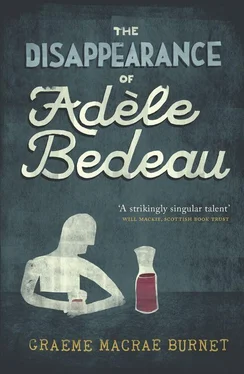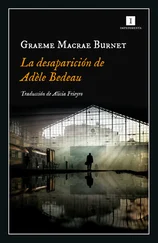At the end of the little park was an apartment building set back from the pavement. Manfred ducked towards the doorway of the apartments and concealed himself behind the shrubbery. The young man was facing in the direction from which Adèle would approach. There was no danger of him spotting Manfred and, even if he turned round, he was well hidden. The youth finished his cigarette and looked at his watch. A few minutes passed. Manfred began to wonder what he was doing there, but he had waited this long, it would be foolish to leave now. In any case, were he to do so, he might make a noise and give himself away.
Adèle appeared, walking slowly along the pavement. The young man raised his hand in greeting and Adèle waved back but did not quicken her pace. Manfred wondered why he did not meet her outside the bar. They must have some reason to not wish to be seen together. Perhaps their parents did not approve of their liaisons. Manfred, though, could not imagine Adèle living with her parents. If asked, he would have guessed that she was an orphan or that she had run away from home. There was something in her self-containment that suggested she was alone in the world.
They greeted each other with a more passionate kiss than the previous evening. They remained in a close embrace for some time. The young man put his right hand on Adèle’s behind. She gripped the back of his neck and arched her groin into his thigh. Manfred could feel himself becoming aroused. When they parted, the young man offered Adèle a cigarette, which she accepted. They climbed onto the scooter. They made a wide turn in the road and rode off, Adèle’s arms around the youth’s waist. And that was that. That was what Manfred had furtively loitered to see. He hurried off, suddenly afraid that someone might have seen him spying on the couple. But it was late and the streets of Saint-Louis were deserted.
MANFRED DID NOT WAVER from his usual Friday selection, andouillette with mustard sauce and mashed potato. Adèle had not turned up for work. Manfred felt a pang of disappointment. He realised he had been looking forward to seeing her. Pasteur was in a foul mood as Adèle’s absence obliged him to wait tables. He took orders brusquely, tapping his pencil on his notepad as he waited for diners to reach a decision. Manfred did not ask him where Adèle was. Nor did he ask for his empty water jug to be filled. Pasteur’s ill temper upset the ambience of the restaurant. Customers were not given to lingering over their lunch at any time, but today they ate more quickly than usual. While one normally had to raise one’s voice to be heard over the din of clattering plates and animated chatter, the atmosphere was now subdued. Manfred ate his pear tart and paid his bill hurriedly. He was left with fifteen minutes to kill before he had to go back to the bank. He could think of nothing to do, so went back anyway. No one commented on his early return.
In the evening Adèle was still absent. The restaurant was quiet and Pasteur was back in his usual place behind the counter. His foul mood seemed to have subsided. When he was on his second glass, Manfred asked him where Adèle was. He tried to keep his tone casual.
Pasteur shrugged. ‘She didn’t turn up at lunch and she didn’t turn up this evening.’
‘Is she ill?’
‘Your guess is as good as mine, pal,’ said Pasteur.
Manfred ignored his curt tone.
‘She hasn’t called?’
Pasteur looked up impatiently from his paper. He had said all he wished to on the subject. When Marie emerged from the kitchen, Manfred contemplated asking her, but he thought better of it. People might wonder about this sudden interest in the waitress. If Pasteur was not concerned, why should he be? Why indeed was he so interested? In the months that Adèle had worked at the restaurant he had rarely given her a second thought, other than lustful ones. He had never once wondered where she lived, what she did in her spare time or what, if anything, went on in her head.
Later on, after Marie had taken the final carafe of the evening to Lemerre’s table, she paused behind the counter to wipe down the surfaces. This was Pasteur’s job, but he plainly thought he had done enough menial work for the day.
‘Busy day, Marie?’ Manfred said.
‘A busy day, yes, Monsieur Baumann,’ she replied, before disappearing into the kitchen. Manfred nursed his final glass of wine a little longer than usual. Marie emerged from the kitchen a few minutes later, but she did not linger by the counter. She set the tables for the following day’s service before retiring to the apartment upstairs. Manfred paid his bill and left.
Around three o’clock the following afternoon Manfred was sitting at the table in his kitchen reading a detective novel. There was a knock at the door. He started. No one ever called on him and anyone wishing to do so would have to use the buzzer in the street to gain access to the building. He sat stock-still for a few moments. It was probably some pollster or evangelist whom another resident had allowed in. Manfred held his breath and strained his ear for the sound of departing footsteps. Then there was a second sharp knock. It was an insistent, impatient rap — one that suggested the person on the other side of the door knew he was inside. Manfred pushed his chair back silently and padded along the passage. He listened for a moment and then put his eye to the peephole.
A man with closely cropped grey hair and narrow grey eyes was looking directly at the door. Manfred recognised him. He was a policeman. When Manfred opened the door, he held up his ID, which he must have been holding in his hand in readiness. ‘Inspector Gorski, Saint-Louis police.’
‘Yes,’ said Manfred.
Gorski was a stocky man of average height in his mid- or late forties. He was wearing a slate grey suit, dark blue shirt and a tie of a similar colour. He had a light raincoat folded over his left arm. He showed no sign of recognising Manfred. Manfred held out his hand and then let it fall to his side. Was one supposed to shake hands with a policeman?
‘Might I have a word, Monsieur Baumann?’
There was no reason to be alarmed that the detective knew his name. It was inscribed on the small silver plaque on the door.
‘Of course.’
There was a pause. Manfred waited for the policeman to say something else before he realised that he was waiting to be invited inside. He stood back from the door. Gorski thanked him and stepped into the narrow passage that led to the kitchen. Gorski was obliged to squeeze past Manfred, before Manfred in turn squeezed past him to show him into the kitchen. For a number of years Manfred had employed a cleaner, but he had never liked having someone else poking around the apartment. It made him feel uncomfortable and there was, in any case, little for her to do as he was quite fastidious. He washed up as soon as he had finished eating and firmly adhered to the credo of keeping everything in its place. The old woman used to vacuum the already immaculate rooms and take care of his laundry and ironing, a chore Manfred disliked. But it embarrassed him to think of her stripping his bed and washing and folding away his underwear. Manfred had been relieved when she died (he could not have possibly dismissed her), and in the four years since then few people had set foot in his apartment. These days Manfred did his laundry in the scullery in the basement of the building on Sunday afternoons. It was not enjoyable, but it served to occupy a part of the weekend he otherwise struggled to fill.
The two men stood face to face in the kitchen. Manfred felt that the detective was scrutinising him. If there was a flicker of recognition in his grey eyes, he would most likely ascribe it to the fact that in a town like Saint-Louis the inhabitants crossed paths a great deal. Indeed, though he generally kept to the opposite pavement, Manfred walked past the police station on his way to and from the Restaurant de la Cloche every day. It would, in fact, be odd if the detective had never seen him.
Читать дальше












